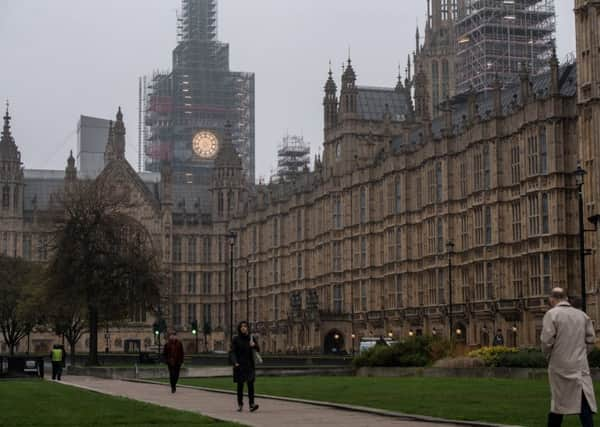Euan McColm: Missed chance to question Labour's Syria stance


Be reassured, then, that if some glitch in time should occur, Abbott, Jeremy Corbyn and their front-bench colleagues will stand four square behind the effort to end Adolf Hitler’s murderous campaign.
The subject under discussion on Friday was Syria, where the forces of President Bashar al-Assad have carried out yet another chemical weapon attack on innocent civilians.
Advertisement
Hide AdAdvertisement
Hide AdAbbott’s position was that there was no military solution to the situation in Syria, where seven years of civil war has seen Assad unleash brutal strikes on non-combatants.
Prime Minister Theresa May, along with US President Donald Trump and France’s President Emmanuel Macron, made it abundantly clear they disagree with this view, when, early yesterday, allied forces carried out a series of bombing raids, targeting three chemical weapons sites. Missiles struck a scientific research facility, alleged to have been used in the production of chemical and biological weapons, in the capital, Damascus, along with two other sites near the city of Homs.
The political backlash is predictable and perfectly understandable. Labour – along with the SNP – had demanded that parliament be given a vote on whether the United Kingdom should get involved in military action.
May was perfectly entitled to make the commitment she did without consulting MPs, though, given the House of Commons had a say on previous occasions when the matter of intervention in Syria arose, members may be forgiven for feeling the same courtesy should have been extended on this occasion. They believe a precedent was set by a Commons vote in 2013 when Labour, under Ed Miliband, led opposition to action and defeated David Cameron’s government, which was then in favour.
The Prime Minister’s decision to commit UK service personnel to yesterday’s bombing raids plays into her opponents’ hands. How could it not? She has, unavoidably, given weight to a narrative that says this is a reckless, warmongering government.
Looming over the Prime Minister’s decision, as it has over every decision on military intervention for the past 15 years, is the Iraq War.
The backlash against former prime minister Tony Blair over flawed intelligence used to justify action in 2003 chills the blood of those who follow in his political footsteps. On matters military, Iraq slows each political impulse down to indecision.
This being so, the Prime Minister’s decision not to seek parliament’s approval is not entirely surprising.
Advertisement
Hide AdAdvertisement
Hide AdMay has, however, denied us the opportunity to see both sides of the argument on action properly interrogated. This may not have been entirely comfortable for those against.
Abbott is not the loose cannon of caricature, she is a key member of the Labour front bench. There are those who regard her interview on Today as something of a car crash, but she did not say anything that we would not have expected to hear from her leader.
A parliamentary debate in which Corbyn gave a greater insight into precisely when it is, in his opinion, morally correct to intervene militarily would have been instructive, I’m sure.
If we accept – and some conspiracists, egged on by Russian propagandists, don’t – that footage of suffering children and dead families in Douma is genuine then pointing to Iraq as a reason not to act is surely not an adequate response.
Corbyn’s reluctance to support military action in Syria is entirely in keeping with his track record on intervention by the West. He was, after all, chairman of the Stop the War coalition from 2011 until his election as Labour leader in 2015.
That organisation, established by – among others – members of the far left Socialist Workers Party, exists to condemn any and all interventions by western governments. You will not, however, find many Stop the War campaigners outside the Russian embassy this weekend, protesting about Vladimir Putin’s support for Assad.
When the Prime Minister returns to the Commons tomorrow, many on her own side of the House will be as angry as the opposition that they were not invited to vote on whether the RAF should have joined US and French forces yesterday.
Within hours of the strikes in Syria, the SNP’s Westminster leader, Ian Blackford, set the tone for what is to come when he said the PM was “dancing to the tune of Donald Trump”.
Advertisement
Hide AdAdvertisement
Hide AdWe can, I think, expect more heat than light in parliamentary exchanges to come. This seeming inevitability would be deeply unfortunate. The UK’s involvement in yesterday’s limited action cannot be undone. What we need to know now is where, precisely, the Prime Minister believes this all leads.
Does she expect the bombing raids to bring conflict in Syria closer to some kind of peaceful resolution and, if not, then what next? Was this a one-off intervention or are more likely?
I fear that, rather than moving towards a bigger picture, the political debate will be ugly and accusatory.
Being “right” about the Iraq War does not automatically make one right to argue for no involvement in Syria. The two situations are different and – as Theresa May re-iterated yesterday when she said regime change was not the intention – so are the objectives.
Corbyn was unimpressed, declaring the strikes “legally questionable” and insisting that Britain should be playing a “leadership” role to bring about a ceasefire in Syria. Abbott didn’t go off-piste on the Today programme, after all.
Corbyn’s response to the strikes on three facilities involved in the preparation of chemical weapons was unsurprising. Under his management, Labour’s view on military intervention is that the West is always in the wrong. Except, I’m sure, in the case of the Second World War.